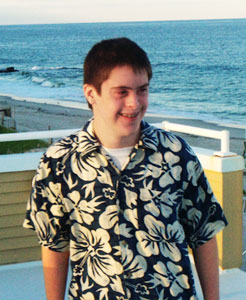What It’s All About, Entering 2018
by Robert J. Doman Jr.
 I recently got a call from an old NACD family that I hadn’t heard from for a few years. They live nearby and asked if they could come visit. They came over with their three children and a pie. It was great seeing them after a number of years.
I recently got a call from an old NACD family that I hadn’t heard from for a few years. They live nearby and asked if they could come visit. They came over with their three children and a pie. It was great seeing them after a number of years.
We were able to catch up on what had been going on in each others lives; but I was particularly interested in their eldest son, who is now a high school senior. Bryan is an impressive young man. He is tall and handsome and amazingly well deported, one of those kids you are immediately impressed with. Throughout the evening he listened respectfully as his parents and I caught up on things and added to the conversation, as you would hope a bright young man would. When I addressed him and asked about where he was with his life, I learned that he was an honors student, on an award winning debate team, an accomplished drummer, and would be going to college next year to pursue computer science and to continue his passion for music. His parents related how in recent years he had been a huge help taking care of his invalid and physically handicapped grandmother, who needed help with all of her daily care. Bryan is an exceptional young man in every way.
Most people who knew Bryan only as a young child would be shocked seeing him today. Those who have the need to label would have called him autistic. He was hyperactive, stimmed almost non-stop, had very limited language ability, couldn’t interact with other children, and couldn’t begin to function in any kind of classroom. To make a long story short, Bryan went on program and within a couple of years he was heading down a different road. Today he’s not a high functioning young man on the spectrum; he is simply a high functioning young man, who was once a little kid.
Our team at NACD and I feel very blessed to be able to help so many children overcome their issues and to simply assist parents in unlocking their children’s hidden potentials. When the parents of children I was working with across the country came to me back in 1978 and told me I had to create a national/international organization and offered to do everything they could to help, I was honored and became driven to try to communicate the foundational concepts behind NACD and to try to change the very perception of potential. The NACD Neurodevelopmental Approach I created back in 1979 is still the underlying foundation. Through the subsequent years we have successfully directly helped tens of thousands of children with our individual TDI programs, and through our educational outreach we have hopefully affected the lives of millions. However, I never thought that changing the status quo could be so difficult.
Neuroplasticity, the heart of our work since the beginning, is certainly not something I discovered, but something that was first understood in the late 1800s. Neuroplasticity is just now barely being acknowledged, is still largely misunderstood and virtually never applied. The understanding of processing, short-term memory and working memory that I have been working with, utilizing, and changing, going all the way back to 1970, are things that the neuroscientists are just now acknowledging can be changed. We haven’t been keeping these and many other things a secret, the world just didn’t, and to a great degree today still doesn’t, want to hear.
When concepts are thought of in the abstract, the lack of understanding and application certainly can be seen as unfortunate. But when viewed relative to a single child, your child, or as I view it, all of the children, it is an incredible tragedy. When I think about the individual children we are helping, from the kids on the autism spectrum in Utah to our brain injured children in Romania, our children with Down syndrome in Panama to our exceptional children in Georgia, I feel elated; but there are all the others.
One of the basics I instill in our staff at NACD is that we can never do what we do fast enough or well enough. We work every day to understand more and create new insights and methods to get there faster. We think like parents, and parents don’t have time to wait. No one knows the value and uniqueness of a child like a parent, and the parents of our NACD international family know firsthand the power they hold in their hands, the power to change the futures of their children.
As we enter 2018 I would like to remind each and every one of our parents that you have the power to help build your child’s life and future. What you can do no one else can do. I would also like to suggest that you also, by example, have the power to change perhaps many thousands of other lives. The example of what you are doing with your child can have tremendous impact. I encourage you to communicate with other parents, groups, and organizations and help educate them as to what can be done. But keep in mind that simply by helping your child you can possibly be influencing the lives of many others.
I will confess that through the years I have become more and more frustrated with trying to change things and have focused on developing our insights and tools and helping those families that come to NACD. I have not been out talking to everyone else, as I should; but this year I am going to make a new commitment to get out and try to do more to educate. I will also continue working to train more people so that we can directly help more children.
Perhaps in 2018 I can get all of you to help. Let’s identify more families that might be open to a new perspective and who are willing to stop abdicating their responsibility for their children’s development and education and who just need the vision, the guidance, support and tools to take charge.
There probably are not many better feelings than those I had the other night after seeing Bryan again. Having the honor and privilege to help change a life is really tough to beat.
So, in 2018, let’s all recommit to doing our very best job with our children and to seeing if we can help change some other lives as well. After all, helping our children and helping each other—isn’t that what it’s all about?





